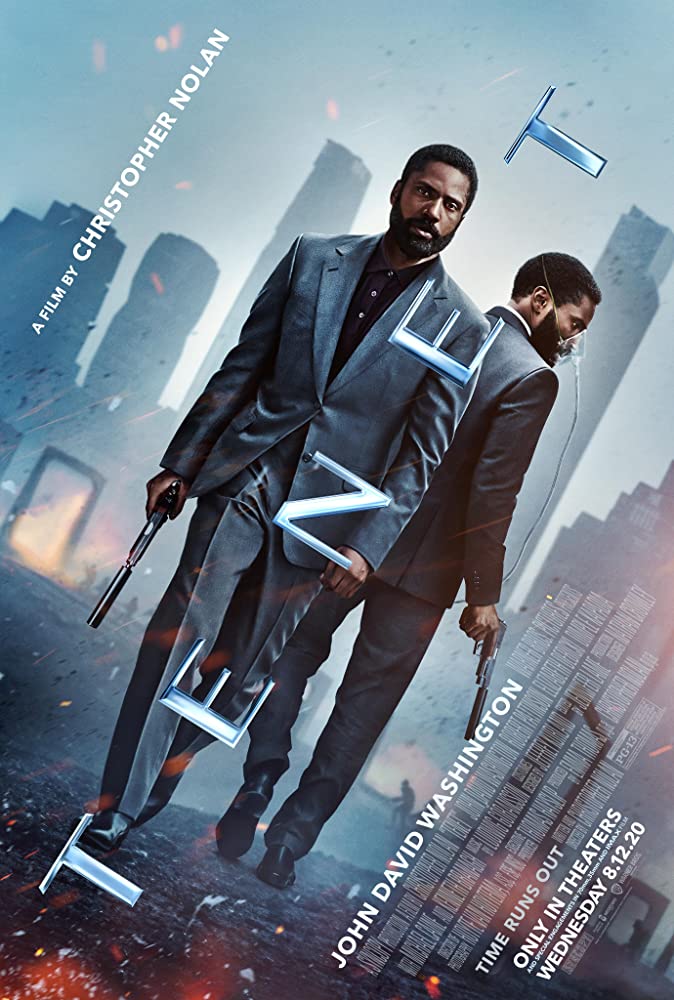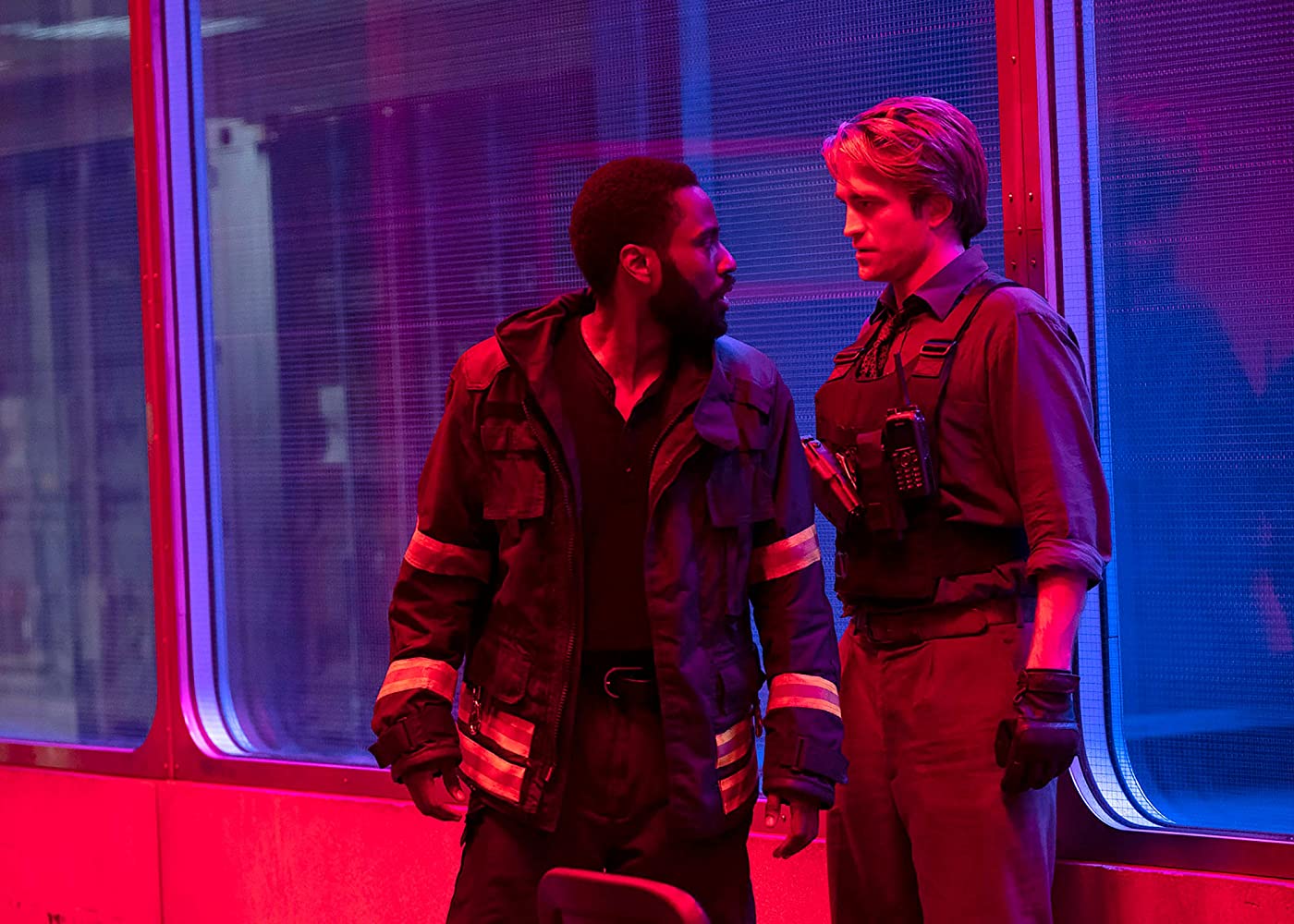
“Does your head hurt yet?”
This is the question posed by Robert Pattinson’s character ‘Neil’ during Tenet, as he explains the concept of reverse entropy to the David John Washington’s protagonist – who helpfully goes under that name (‘Protagonist’) throughout the film. It could just as easily apply to any of us during the last six months of global chaos, economic shutdown, fluctuating travel restrictions, crushing social isolation, and various other attendant miseries caused by the reaction to a certain nasty little virus.
The release of a Christopher Nolan film has become a cinematic event. The release of Nolan’s Tenet has become a landmark event simply for being the first new film released in theatres after the aforementioned global shutdown that has thrown both film production and film release schedules into total and possibly catastrophic long-term disarray. The future of the traditional primary theatrical release has become a questionable prospect in the face of ongoing clampdowns on personal movement and restrictions on venue capacity that will throttle a film’s financial take. For those of us who value cinema as an artform, part of which is having the opportunity to see a film in its own dedicated temple, on the big screen, with an audience, as part of a communal experience, a collective cultural dreaming of sorts, Nolan’s insistence that Tenet would be a ‘in cinemas only’ for a summer 2020 release was heartening.
Anyway, returning to hurting heads, let it be said that Nolan, with Tenet, continues to bring a demanding intelligence to well-worn cinematic genres and tropes that is often missing in big budget releases nowadays, where there too frequently appears to be an inverse ratio between sky high budgets and respect for the audience’s intelligence (coughDisneyStarWarscough). Whereas 2010’s Interception was perhaps Dreamscape with A Levels, Tenet might be classed as James Bond with a PhD in theoretical physics, or perhaps the old Terminator time travel chestnut, dusted down, and sent back to college. Nolan presents us with a relentlessly action-packed espionage-meets-science-fiction flick which flirts with philosophical questions about reality, time, and perception. Car chases, plane crashes and extended fist fights in various foreign locales are relentlessly complicated by quantum physics and an endlessly layering, inverting narrative structure, with perhaps some metatextual conceits about movie-making sprinkled in; nothing could be more Nolan, really.
The story revolves around an CIA agent known only as Protagonist (David John Washington) who, during a mission to liberate a mysterious object from a Kiev opera house during a terrorist siege, attempts suicide to avoid betraying his colleagues. He wakes up to find himself having passed the recruitment test for entry into a shadowy intelligence-linked organisation named Tenet. Tenet’s purpose is allegedly to stop World War 3. From this point on, things start to get complicated.
Protagonist is taken to a secret laboratory and shown some strange ‘debris from a future war’. This future war is not the result of the current world politic, but a far future one that for reasons best known to itself is using an intellectually confounding future quantum technology – entropy reversal – to destroy parts of the present or rather, its own past. It’s clear nobody is really expected to understand how this tech works (even Protagonist looks bewildered at points), but simply accept that suitably ‘inversed’ objects, bullets, cars, weapons, or even people can move backwards in time, albeit with huge risks to themselves. This can be scaled up to a ‘temporal pincer movement’ for military purposes, using one team moving forwards in time and another backwards, both toward the same goal. Forwards and backwards with the same result. Like the word ‘tenet’ reads. Get it?
Protagonist recruits agent ‘Neil’ (a lively Robert Pattinson) with a convenient background in quantum physics who seems to understand this stuff better than he does, during another mission to track down the source of some mysteriously inverted bullets via an arms dealer in Mumbai. This leads him to the big bad guy of the story, a Russian billionaire and arms dealer named Andrei Sator, played with brutal relish and deliciously heavy accent by none other than Sir Kenneth Branagh. Sator’s personal malignancy, his motivations and the depth and significance of the threat he poses grow incrementally with each passing scene – to the point of actually believably establishing the kind of insane megalomania one associates with Bond villains, but devoid of cartoonishly silly quirks or quips. Protagonist’s initial access to this unpleasant oligarch depends on charming his beautiful, aristocratic, but emotionally and physically brutalised English wife, Kat (Elizabeth Debicki) who quickly establishes herself as the emotional, human and moral centre of the film, grounding the huge world-shaking threat to humanity in interpersonal relationships; between mother and son, and between Protagonist and Kat herself. She’s like an inverse Mal from Inception in this respect.

Epic set pieces action scenes abound as Protagonist, Neil and Kat work together to make sense of Sator’s significance to the mysterious far future to undermine his goals. We move in short order from India to England to Norway and Estonia to Vietnam in the travelogue style of old Bond films, and about again. There’s a scene involving a plane used as a weapon to demolish a freeport in Oslo that is pretty staggering, all the more for the fact that it was not done conventionally using CGI, but as a physical effect with a real, purchased aircraft, as it was apparently cheaper to film it that way. There’s also a by-now standard cred-establishing fight in a restaurant kitchen as the protagonist attempts to flee via the back door a la Besson’s La Femme Nikita – which is kind of overused at this point, but there’s clearly something that appeals to directors about this one, so if you’ve ever wanted to see Russians and an American beat the crap out of each other using cheese graters and meat tenderisers, this is your moment.
The climax involves the ruins of an old Soviet secret city shattered by a nuclear accident. It’s an almost otherworldly landscape made all the more alien by the huge temporal pincer military assault upon it. But it’s the strangeness and complexity of the ideas and the abrupt plot twists and turns and shifts in perspectives they reveal that really compel. The bungeeing, brutal ass-kicking, various aquatic antics and mad car chases are just the fancy action icing on the big brain cake.
Tenet’s challenge is less the mind-boggling future quantum tech or the usual time travel paradoxes, but that it is both fast-paced and deliberately obtuse in narrative structure, leaving little to no breathing room to contemplate what has just been said or has just transpired plot-wise. Blink mentally and you could find yourself missing some vital piece of information. Another small niggle, although not a hugely significant one, is occasionally the soundtrack competes with the dialogue to ear-straining effect. It’s the kind of film where you have to accept everyone around you is probably as confused as you are at certain points and just engage as much as possible with events as they happen. It’s enjoyable even when it occasionally leaves you floored and it’s well worth hanging in there, as everything does pull together in the end in a way that suggests we’ve actually just witnessed the beginning of a possible saga, although one I’m sure we won’t see. It’s definitely the kind of film that will reward repeat viewing – I suspect the point, actually. I was left immediately wanting to rewatch the whole film given the final perspective shift that I will not spoil for you here.
Cinema chains globally have suffered huge losses during the shutdown, and studios have become skittish about when, or even if, to place planned new releases in cinemas, placing the cinema industry in some jeopardy. If you think films deserve to be seen in the environment they were designed and produced for – a proper theatre – now is the time to show your support, unless perhaps you are happy with a future consisting of paying ludicrous sums for VOD releases on top of your usual streaming service fees to watch. It’s as good a time as any to vote for the existence of cinema with your wallet. Tenet is well worth the trek back to the multiplex.
Tenet (2020) is available in cinemas now.
